 |
The Challenges of Photographing a Sweeper in Chiang Mai, Thailand
by Ranger Kidwell-RossAfter making inquiries for several days, in an attempt to find out what government agency is in charge of sweeping the streets of Chiang Mai, I had no success. So, I decided to contact the U.S. Consulate, which has an office in the city. That turned out to be a great idea; not only did the person I spoke to know the answer, but the Municipal Offices of Chiang Mai were located right across the street!
Although my inability to speak Thai remained a barrier, the person manning the public relations information center had just enough English for me to get my request over to him. I was then shuttled through only two more offices before meeting the city's official English language interpreter, Chaturayut Promnil. He asked me to call him 'Tar;' his card proclaimed him to be the city's 'Foreign Relations Official.' Tar's English was plenty passable for us to make some real progress.
Like elsewhere in the civilized world, Tar told me that city officials recognize the health problems associated with a high level of fugitive dust and are working to make it better. Although a good sweeping program can have an effect on it, they also understand their problem is more of what falls out of the air than what is coming off the pavement due to vehicle traffic.
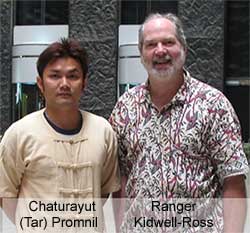
Tar gave me a document called 'Report: The Project to Manage the Air Quality in Chiang Mai.' Unfortunately, it was written in the Thai language, so I had to have it translated. The gist was that the air quality has only in recent years gotten so bad that the government started getting concerned. To get a handle on how to address the problem, for the last several years the air pollution level in Chiang Mai has been the subject of testing.
In this regard, two areas of the city are being sampled on an ongoing basis. One official testing station, at a place called Yuparach Station, was tested 146 times in 2006 and 24 of these brought back readings of a higher level of dust than is considered safe. The composition of carbon dioxide, carbon monoxide, sulfur dioxide, nitrogen dioxide and ozone were also too high.
The other official testing station, Soon Lachakan Station, had 25 unsafe results out of 145 tests. The upshot is that the government wants to have a study done to see how to reduce both air pollution and noise pollution. Recognition of the problem is key to solving it.
The official areas cited in the document as needing improvement included:
- Checking pollutant output of vehicles, which might include enforced mandatory testing of vehicles.
- Best practices announcements to radio, newspapers, etc.
- Establishing controls regulating open burning.
- Restrictions on open cooking for streetside vendors.
- Restrictions on burning of garbage.
I told Tar I wanted to get a picture of at least one of their mechanized sweepers. So, he helpfully went to see if he could get a schedule for me. During that time, I wandered around the building.
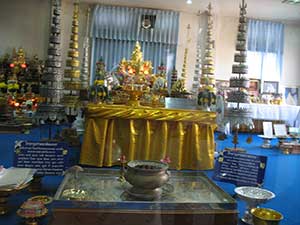
One of the rooms I discovered was a large one dedicated to Buddhism. I assume it was an area where employees could go to reflect or meditate on breaks, though no area for that was visible through the doors. It may have been there only as a visible reminder to remember one's higher purpose. In any event, the beautiful room was a stark contrast to the separation of church and state issue that so infuses current U.S. government buildings.
Unfortunately, the only sweeper route information Tar was able to obtain for the next morning covered the sweeper's whereabouts only from 5am to 7am. Later in the day, they didn't know for sure where the sweeper would be working. To me, the vacationer, this was not a timeframe I wanted to become involved with. Plus, I'd already committed myself to play drums that night at one of the local music clubs and knew we'd run until near 2am there.
Nonetheless, since the next day would be one of my last in the city, I determined to give it a go for the sake of the WorldSweeper.com reading audience. As it turned out, trying to find a sweeper in action in Chiang Mai ended up being somewhat like the merry sweeper chase I'd gone on in Beijing a few years ago.
The alarm went off a few minutes before 5am, before even the roosters' usual time to disturb my sleep at the Wanasit guest house where I was staying in the historic section of Chiang Mai. Looking outside, I noticed it was quite dark, with not even a glimmering of sunrise on the horizon. "Well," I rationalized in groggy sleepiness, "it's only 10 minutes by tuk-tuk to the road where the sweeper's to be found. And, photos won't be very good in the dark. Plus, I know the driver won't have any trouble understanding where I want to go since Tar wrote it down for me in Thai. And..." After only a couple hours of sleep, it was easy to convince myself of the reasonableness of my own arguments; I reset the alarm for 6am and immediately went back to sleep.
For some reason, waking the second time was even more difficult. I simply couldn't get into immediate motion. By the time I was out the door it was 6:30. Still, plenty of time to hike the couple blocks needed to find and flag down a tuk-tuk taxi driver, hand him the Thai directions Tar had provided and then go find the sweeper. It would have been, too, if the grizzled driver of the tuk-tuk hadn't, for some inscrutable reason, taken me to Wararot Market -- which is basically on the other side of town.
By this time it was a few minutes to seven. At the market I ditched that driver without a backward glance and scurried down the street to find another. Fortunately the next tuk-tuk driver turned out to be a young Thai man who could speak a bit of English. Looking at my map and Thai-printed directions, he knew immediately the mistake that had been made. Plus, he caught the important part about the sweeper being done by seven. Armed with that knowledge, he helpfully decided to race against the clock. In Disneyland parlance, what then occurred was definitely an 'E' ticket ride.
By now, the early morning traffic was getting thick. He darted us in and out of fast-closing gaps in traffic as only a 20-year old Thai taxi driver or NASCAR veteran can do. The underpowered vehicle, which must have some kind of small motorcycle engine, seemed doomed time and again as he willed oncoming vehicles to get out of our way. Fortunately, they did, though my knuckles were white from holding on inside the small, open-air back seat. I even closed my eyes a couple of times actually expecting an impact, and I pride myself a tuk-tuk veteran.
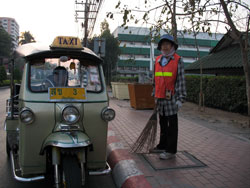 We made it to the destination road by only a couple minutes after seven. Too late, as it turned out. After traversing down the thoroughfare for about a kilometer of roadway that was conspicuously clean, the driver spotted a lady in a municipal orange safety vest sweeping around a sidewalk planter. Stopping to ask her where the sweeper was, I could tell immediately by her glance in my direction that the answer wasn't good. She, too, spoke a little English, two words of which she exercised directly to me: "Too late," she advised with a shake of her broom.
We made it to the destination road by only a couple minutes after seven. Too late, as it turned out. After traversing down the thoroughfare for about a kilometer of roadway that was conspicuously clean, the driver spotted a lady in a municipal orange safety vest sweeping around a sidewalk planter. Stopping to ask her where the sweeper was, I could tell immediately by her glance in my direction that the answer wasn't good. She, too, spoke a little English, two words of which she exercised directly to me: "Too late," she advised with a shake of her broom.
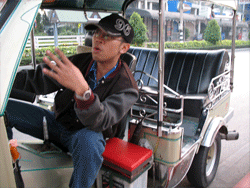 The good news was that she knew the sweeper would be back in her area sometime the next day between 4 and 5pm. Armed with that info, I took a couple of pictures of her and gave directions to the driver that I hoped would have me back in bed within the half hour.
The good news was that she knew the sweeper would be back in her area sometime the next day between 4 and 5pm. Armed with that info, I took a couple of pictures of her and gave directions to the driver that I hoped would have me back in bed within the half hour.
Then, for the first time that day, fortune smiled. Maybe laughed. As we careened around a corner not 100 meters from my guest house, there was a sweeper, which turned out to be the yellow Ravo 4000 shown. The tuk-tuk driver's eye contact in the rear view mirror showed that his surprise was as great as mine. He immediately zigzagged his way to the curb lane and I hazarded the now crushing traffic to take pictures.
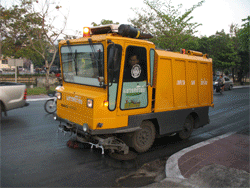
No doubt still sleepy drivers careened around the crazy farang with a camera who was out almost in the traffic lane risking his life to take pictures of, unbelievably, a street sweeper. The sweeper operator, who was in transport mode when I first spotted him, immediately swung over toward the curb and started to sweep. He no doubt realized that the guy about to be run over was no doubt the one he'd been alerted to watch out for on his shift. After all, how many people like that could there be in Thailand, let along Chiang Mai?
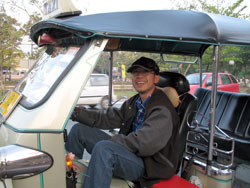 After successfully grabbing some shots I went back to the tuk-tuk driver, who'd pulled to the curbside to wait, and offered the heartfelt Thai thank you of 'cupcoomcup.' Ten minutes later I was back at the guesthouse and he had returned the sincere thanks with a face-wide smile as the result of the 50Baht tip I gave him on his 150Baht fare (about $5US total).
After successfully grabbing some shots I went back to the tuk-tuk driver, who'd pulled to the curbside to wait, and offered the heartfelt Thai thank you of 'cupcoomcup.' Ten minutes later I was back at the guesthouse and he had returned the sincere thanks with a face-wide smile as the result of the 50Baht tip I gave him on his 150Baht fare (about $5US total).
After staying awake long enough to write up my notes, I went back to bed to get the sleep my body and mind ached for. Tomorrow, my last day in Chiang Mai, I have a scheduled 10:30am meeting with Mr. Somchart Pholphasi, Chief of the Cleaning Section for a quarter of Chiang Mai.
We invite you to check out our two online slideshows of Thai culture, as well as a Quicktime video showing traffic at a busy intersection.
 |
 |
© 2005 - 2021 World Sweeper
|
Thailand Table of Contents
Site Map/Table of Contents |